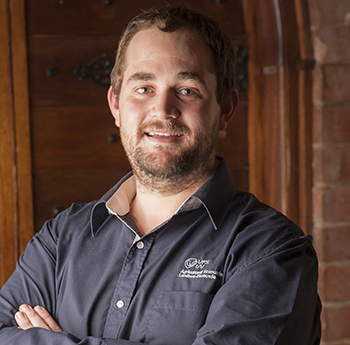Latest News Archive
Please select Category, Year, and then Month to display items
08 April 2021
|
Story Thabo Kessah
|
Photo UFS Photo Archive
 Dr KPD Maphalla with former UFS Chancellor, Dr Franklin Sonn, during the graduations in April 2007.
Dr KPD Maphalla with former UFS Chancellor, Dr Franklin Sonn, during the graduations in April 2007.
The University of the Free State is sad to learn of the passing of alumnus and award-winning Sesotho literary giant, Dr KPD Maphalla.
The literary works of Dr Khotso Pieter David Maphalla, like many other African writers and artists, were influenced and characterised by his own era of powerful forms of oppression and exclusion from dominant literary discourses. In his own right and through his writings of poetry, novels, short stories, and kodiamalla (dirge), he articulated a deliberate political and social protest and pushed for a place for African languages in literature at the height of apartheid.
“He entered the professional scene with his ground-breaking novel, Kabelwamanong, in 1982 at the age of 27. His career actually started in 1971 while he was still at school. Since his first novel, he has produced at least two books annually, covering the genres of poetry, novels, dramas, and short stories. As a dramatist, Dr Maphalla has written a number of excellent and educative radio dramas for the then Radio Sesotho (now Lesedi FM),” said his long-time friend and Head: African Languages at the University of the Free State, Dr Nyefolo Malete.
“It was for this writing prowess that he received recognition from the UFS when he was awarded an Honorary Doctorate in Literature by the Department of African Languages during a momentous ceremony on the Qwaqwa Campus in 2007,” added Dr Malete.
Dr Malete also revealed that, despite losing the use of his right hand after suffering a stroke following a car accident in the late 1990s, Dr Maphalla continued writing using his left hand. “He was adamant that, what he referred to as his ‘supposed disability’, would not deter his passion for writing.”
Dr Maphalla’s work has also produced numerous scholarly studies by the likes of Profs Moleleki Moleleki (protest poetry), Thapelo Selepe (lament and protest poetry), and Dr Seema Seema (process of cross-cultural communication). He was a committed Qwaqwa community member, who was also instrumental in the founding of Qwaqwa Community Radio (2000) and Metjodi Writers (2006), among others. He has written more than 70 books, many of which have been prescribed texts in schools.
Some of the awards he has won include:
South African Centre for Digital Language Resource (SADiLar) Sesotho Lexicographic Unit (Sesiu sa Sesotho) Lifetime Award for outstanding literary works and for promoting Sesotho literature (2019).
The Literature Festival and the University of the Free State Award for enormous contribution to Sesotho literature by a South African writer (2019).
Lifetime Achiever Award in Literature awarded by the Department of Arts and Culture (2005).
M-Net Book Prize for Sesotho poetry (2005). The first and thus far the only Sesotho author to have received this honour.
M-Net Book Prize for best novel (1996).
De Jager-HAUM Literary Award for his volume of short stories, Mohlomong Hosane (1993).
Thomas Mofolo Trophy for Best Novel, Best Poetry, and the Overall Award (1992).
Thomas Mofolo Trophy for Best Poetry (1991).
Dr JJ Moiloa Floating Trophy for Best Sesotho Poetry Book of the Year, Kgapa tsa ka (1985).
Dr Dirk Strydom named 2015 Free State Agriculturist of the Year
2015-11-30

Dr Dirk Strydom, head of the Department of Agricultural Economics at the University of the Free State, was chosen as the 2015 Free State Agriculturist of the Year by the Agricultural Writers Central Region.
Photo: Sonia Small |
Dr Dirk Strydom, a member of the Vice-Chancellor’s Prestige Scholars Programme (PSP) at the University of the Free State (UFS), was presented with the title of 2015 Free State Agriculturist of the Year.
Dr Strydom, head of the Department of Agricultural Economics, received the award on 23 October 2015 from the Agricultural Writers Central Region, the professional association promoting the image and standards of agricultural journalism in South Africa.
“A driven and ambitious young academic,” is how Dr Strydom is described.
According to the Agricultural Writers, Dr Strydom is blessed with the rare skill of bringing to his engagement with the agricultural community at large the same excitement and focus with which he approaches his students and his research.
“Strydom has perfected the art of disseminating complicated theory, and the intricacies of the South African Futures Exchange to the agricultural community.”
Dr Strydom epitomises the new generation of young scholars emerging from the PSP. This new breed of academic is very aware of the need to translate published scholarly discourse into practical usefulness for the broader public.
Hence Dr Strydom’s emphasis on the duty of the scholar to share vital innovation, intricate research, and its applications, not only with students but with the community at large.
The award is recognition for Dr Strydom’s work by the agricultural community.
He was also the recent recipient of an award from the Brahman breeders for his “outstanding scientific contribution” to their industry.